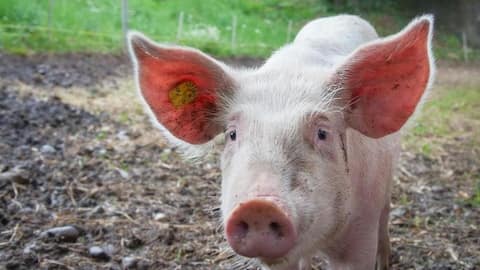Successful experiment paves way for pig liver transplants in humans
What's the story
A remarkable experiment at the University of Pennsylvania has given hope for future animal-to-human organ transplants by successfully connecting a pig liver to a brain-dead human body. The pig liver acted as an external "bridge" for blood cleansing and effectively filtered blood for 72 hours. This innovative method could help address the severe shortage of liver transplants, as nearly 10,000 people in the US are currently waiting for one.
Experiment
Genetically modified pig organs and xenotransplantation
To tackle the issue of human immune system rejection in xenotransplants (animal-to-human transplants), researchers have started genetically modifying pig organs to make them more human-like, reducing the body's resistance to foreign animal tissue. In this experiment, a genetically modified pig liver from eGenesis was connected to an OrganOx device, which is designed to preserve donated human livers before transplantation.
Details
Experiment details and future implications
The test was carried out on a person whose organs were unsuitable for donation, but whose family agreed to offer the body for research. The machines maintained blood circulation throughout the experiment, which took place last month. The donor's body remained stable, and the pig liver showed no signs of damage. Dr. Parsia Vagefi of UT Southwestern Medical Centre praised the researchers, stating, "I applaud them for pushing this forward." This breakthrough could lead to more animal-to-human transplant solutions.
More experiments
Animal to human transplants: How close are we?
According to a report published by the National Library of Medicine, hundreds of thousands of patients have received new hearts, livers, and kidneys with animal to human transplants since the early 1980s. "Other organs (lung, pancreas, and intestine) are also routinely transplanted, albeit in smaller numbers," states the report. Despite all achievements, the gap between organ need and organ availability poses a challenge.
Qualities
Qualities of an ideal animal donor
According to the same report, for the targeted organ to operate well in humans, the animal's anatomy and physiology must be compatible with humans. An ideal donor organ from an animal should also be immune to human illnesses, particularly viral ones. In order to attain economies of scale, this type of animal should also be cheap to feed and reproduce, with many births each litter and short gestation periods.
